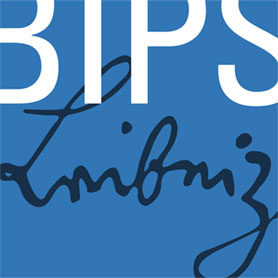ECRA Member Paula Herrera Espejel
"The purpose of my PhD research project is to investigate how digital solutions might encourage people from different cultural and linguistic backgrounds to take part in population-based research. Ultimately, the goal is to reduce the underrepresentation of such groups and improve the generalizability of studies used in public health decisions."
The PhD research project and our working hypothesis
Together with the “Human-computer Interaction” research group at the University of Bremen and the “Field work” unit in the Department “Epidemiological Methods and Etiological Research" at Leibniz Institute for Prevention Research and Epidemiology – BIPS, I will investigate how different digital services that augment written documents, such as automatic translations or text-to-speech services, might offer solutions for addressing both language and readability problems of hard-to-reach groups in public health surveys and epidemiological research. This research will serve the purpose of informing the design, development and deployment of the designated Companion Web App (CWA) digital system by an interdisciplinary team of research scientists and engineers.
Population-based research is increasingly challenged by decreasing response proportions, which may result in biased estimates ultimately undermining the generalizability of the studies. In some cases, unit nonresponse might be associated with the intelligibility of visual-verbal communication of the material in hand. Although some people would be willing to participate in a scientific research project with their data, they might not just because they do not correctly comprehend the invitation letter and study information due to language or literacy barriers. These hindrances can potentially be attenuated by addressing the readability of the recruitment documents, and tailoring the material to fit the communication needs of the addressees. One solution is to consider integrating digital services as a supplementary component to the original paper-based postal contact and recruitment strategies with the purpose of enhancing the available communication material. For instance, by anticipating an easy to access online-based portal where addressees can intuitively access a translated version of the original printed content with a language switcher, as well as have the option to have the text read-out-loud to them or readapt the font sizes of the printed version.
Under such logic, our main hypothesis posits that by providing automatic translations of the original content to their preferred language, or by facilitating online-based text-to-speech services that read aloud the original text to them, a significant proportion of addresses could potentially be encouraged to respond and further engage in the project, reducing gap in representation among subpopulations with diverse literacy or language knowledge levels. While anticipating a dynamic and customizable mechanism to compensate for linguistic and literacy diversity, we therefore expect that the response proportions of otherwise underrepresented groups will most likely increase.
The German case study for testing the CWA system and hypothesis
To provide evidence of its working value, the impact of use of the CWA will be tested against the usual paper-based recruitment mode (without any digital components) in ongoing epidemiological research projects at the BIPS. The German population is a suitable case study for testing the product and working hypothesis. From one side, epidemiological studies addressing health of the German society tend to yield a lower response proportion of participants from key demographics of the population (e.g. see Saß, 2015). In a continuously growing multicultural and multilingual society, where over 21 million of residents have a migration background (refer to Destatis 07.2020) and are prone to interact in other languages with greater proficiency, the lower figures might be reasonably assumed to be linked to language limitations and/or readability barriers at the point of contact and recruitment as contributing factors. Moreover, and independently of the resident’s background or skills, there is a growing number of people that own digital devices with access to the internet, reaching more than 56 million smartphone users (Bitkom 02.2021). In addition to this, and in light of the German legal and practical restrictions to acquire and access contact details of addressees other than postal addresses, the recruitment of participants for research studies often needs to be conducted by means of an initial postal contact, hence, rendering a direct initial contact via digital media impossible. Using a digital recruitment strategy as supplementary to the usual postal paper-based mode is an innovative solution which is fitted to the legal framework protecting contact details of residents in the country.
General Project Organization
The thesis project envisages three main working phases with corresponding work packages and deliverables. The first phase aims to explore existing digital services with the purpose of developing one or more high-fidelity prototypes (mockups) of the Companion Web App (CWA) platform. A major component of this first phase is thus to understand how specific digital technology, such as machine translation, can be optimally integrated into the contact and recruitment workflow of a research project. Research will be conducted on how to integrate both the paper-based and digital resources into a cohesive and user-friendly design, as well as focus on how to design pictorial and non-verbal (written language) free instructions to guide persons to access and inform the online-based platform for digitally tailor-made material. In parallel, a group of potential beneficiaries/users will be assembled to identify necessary characteristics and features of the CWA via a co-creational development approach and group creativity techniques. Based on results of both exploration and co-creation, one or more prototype version(s) will be designed and developed. In the second phase, the PhD research project aims to evaluate its feasibility, acceptability and effectiveness in increasing participation. Accordingly, the project will focus on testing different prototypes of the CWA and evaluate their benefit to recruiting potential participants. It is planned to test and evaluate the effectiveness of the CWA by embedding small trials into ongoing epidemiological studies at BIPS. Some foreseen outcomes of interest in the assessment of the CWA’s impact are contact proportion, response proportion, time to response, and item non-response. Furthermore, feasibility and acceptability assessments are planned to be carried out among study participants. In third place, a final phase is envisioned for evaluating existing digital services, e.g. for automatic translation and text-to-speech technologies, and developing adequate automatic reading and translations. To this end, the CWA system should be developed over the course of this project. Available digital services identified in the first phase will be assessed with regard to functionalities, quality of service, technical requirements for end devices, and terms of usage. Based on the experience and knowledge collected in the field, the development of the CWA with full functionalities will take place starting the second half of the project to enable easy use of this technology in other field studies.
Contact
Paula Herrera, Master in Public Policy (Analysis)
Leibniz-Institut für Präventionsforschung und Epidemiologie - BIPS
Department of Epidemiological Methods and Etiology Research
Achterstraße 30
28359 Bremen, Deutschland
Telefon: +49 157 38821118
E-Mail: herrera@leibniz-bips.de
Websites: BIPS| Research Gate
Together with the “Human-computer Interaction” research group at the University of Bremen and the “Field work” unit in the Department “Epidemiological Methods and Etiological Research" at Leibniz Institute for Prevention Research and Epidemiology – BIPS, I will investigate how different digital services that augment written documents, such as automatic translations or text-to-speech services, might offer solutions for addressing both language and readability problems of hard-to-reach groups in public health surveys and epidemiological research. This research will serve the purpose of informing the design, development and deployment of the designated Companion Web App (CWA) digital system by an interdisciplinary team of research scientists and engineers.
Population-based research is increasingly challenged by decreasing response proportions, which may result in biased estimates ultimately undermining the generalizability of the studies. In some cases, unit nonresponse might be associated with the intelligibility of visual-verbal communication of the material in hand. Although some people would be willing to participate in a scientific research project with their data, they might not just because they do not correctly comprehend the invitation letter and study information due to language or literacy barriers. These hindrances can potentially be attenuated by addressing the readability of the recruitment documents, and tailoring the material to fit the communication needs of the addressees. One solution is to consider integrating digital services as a supplementary component to the original paper-based postal contact and recruitment strategies with the purpose of enhancing the available communication material. For instance, by anticipating an easy to access online-based portal where addressees can intuitively access a translated version of the original printed content with a language switcher, as well as have the option to have the text read-out-loud to them or readapt the font sizes of the printed version.
Under such logic, our main hypothesis posits that by providing automatic translations of the original content to their preferred language, or by facilitating online-based text-to-speech services that read aloud the original text to them, a significant proportion of addresses could potentially be encouraged to respond and further engage in the project, reducing gap in representation among subpopulations with diverse literacy or language knowledge levels. While anticipating a dynamic and customizable mechanism to compensate for linguistic and literacy diversity, we therefore expect that the response proportions of otherwise underrepresented groups will most likely increase.
The German case study for testing the CWA system and hypothesis
To provide evidence of its working value, the impact of use of the CWA will be tested against the usual paper-based recruitment mode (without any digital components) in ongoing epidemiological research projects at the BIPS. The German population is a suitable case study for testing the product and working hypothesis. From one side, epidemiological studies addressing health of the German society tend to yield a lower response proportion of participants from key demographics of the population (e.g. see Saß, 2015). In a continuously growing multicultural and multilingual society, where over 21 million of residents have a migration background (refer to Destatis 07.2020) and are prone to interact in other languages with greater proficiency, the lower figures might be reasonably assumed to be linked to language limitations and/or readability barriers at the point of contact and recruitment as contributing factors. Moreover, and independently of the resident’s background or skills, there is a growing number of people that own digital devices with access to the internet, reaching more than 56 million smartphone users (Bitkom 02.2021). In addition to this, and in light of the German legal and practical restrictions to acquire and access contact details of addressees other than postal addresses, the recruitment of participants for research studies often needs to be conducted by means of an initial postal contact, hence, rendering a direct initial contact via digital media impossible. Using a digital recruitment strategy as supplementary to the usual postal paper-based mode is an innovative solution which is fitted to the legal framework protecting contact details of residents in the country.
General Project Organization
The thesis project envisages three main working phases with corresponding work packages and deliverables. The first phase aims to explore existing digital services with the purpose of developing one or more high-fidelity prototypes (mockups) of the Companion Web App (CWA) platform. A major component of this first phase is thus to understand how specific digital technology, such as machine translation, can be optimally integrated into the contact and recruitment workflow of a research project. Research will be conducted on how to integrate both the paper-based and digital resources into a cohesive and user-friendly design, as well as focus on how to design pictorial and non-verbal (written language) free instructions to guide persons to access and inform the online-based platform for digitally tailor-made material. In parallel, a group of potential beneficiaries/users will be assembled to identify necessary characteristics and features of the CWA via a co-creational development approach and group creativity techniques. Based on results of both exploration and co-creation, one or more prototype version(s) will be designed and developed. In the second phase, the PhD research project aims to evaluate its feasibility, acceptability and effectiveness in increasing participation. Accordingly, the project will focus on testing different prototypes of the CWA and evaluate their benefit to recruiting potential participants. It is planned to test and evaluate the effectiveness of the CWA by embedding small trials into ongoing epidemiological studies at BIPS. Some foreseen outcomes of interest in the assessment of the CWA’s impact are contact proportion, response proportion, time to response, and item non-response. Furthermore, feasibility and acceptability assessments are planned to be carried out among study participants. In third place, a final phase is envisioned for evaluating existing digital services, e.g. for automatic translation and text-to-speech technologies, and developing adequate automatic reading and translations. To this end, the CWA system should be developed over the course of this project. Available digital services identified in the first phase will be assessed with regard to functionalities, quality of service, technical requirements for end devices, and terms of usage. Based on the experience and knowledge collected in the field, the development of the CWA with full functionalities will take place starting the second half of the project to enable easy use of this technology in other field studies.
Contact
Paula Herrera, Master in Public Policy (Analysis)
Leibniz-Institut für Präventionsforschung und Epidemiologie - BIPS
Department of Epidemiological Methods and Etiology Research
Achterstraße 30
28359 Bremen, Deutschland
Telefon: +49 157 38821118
E-Mail: herrera@leibniz-bips.de
Websites: BIPS| Research Gate
 English (United Kingdom)
English (United Kingdom)  Deutsch (Deutschland)
Deutsch (Deutschland) 



